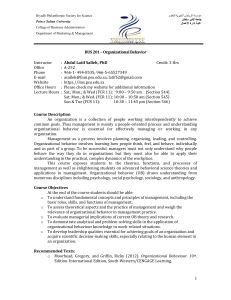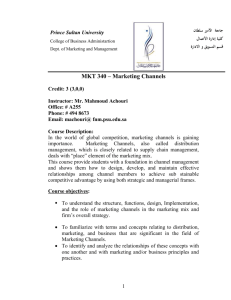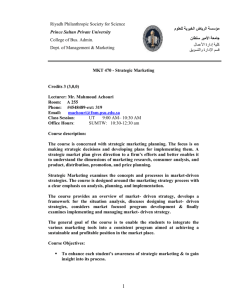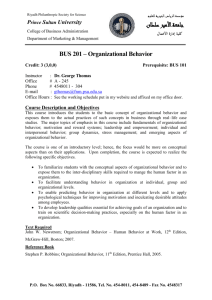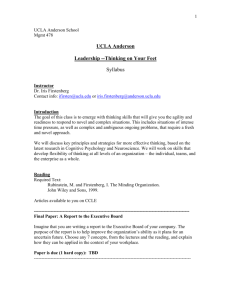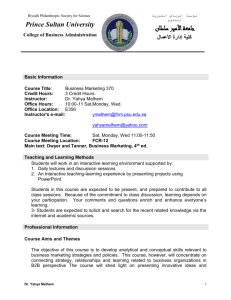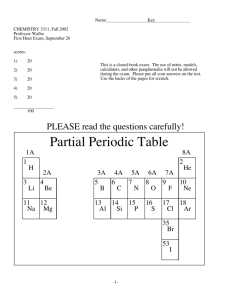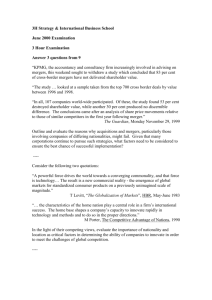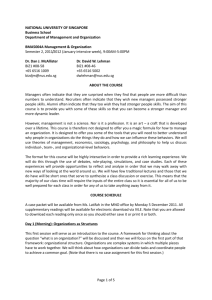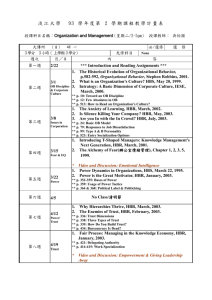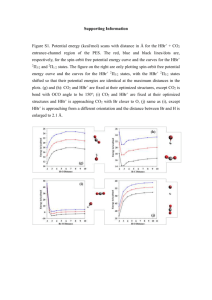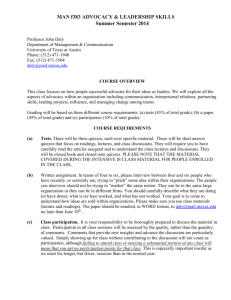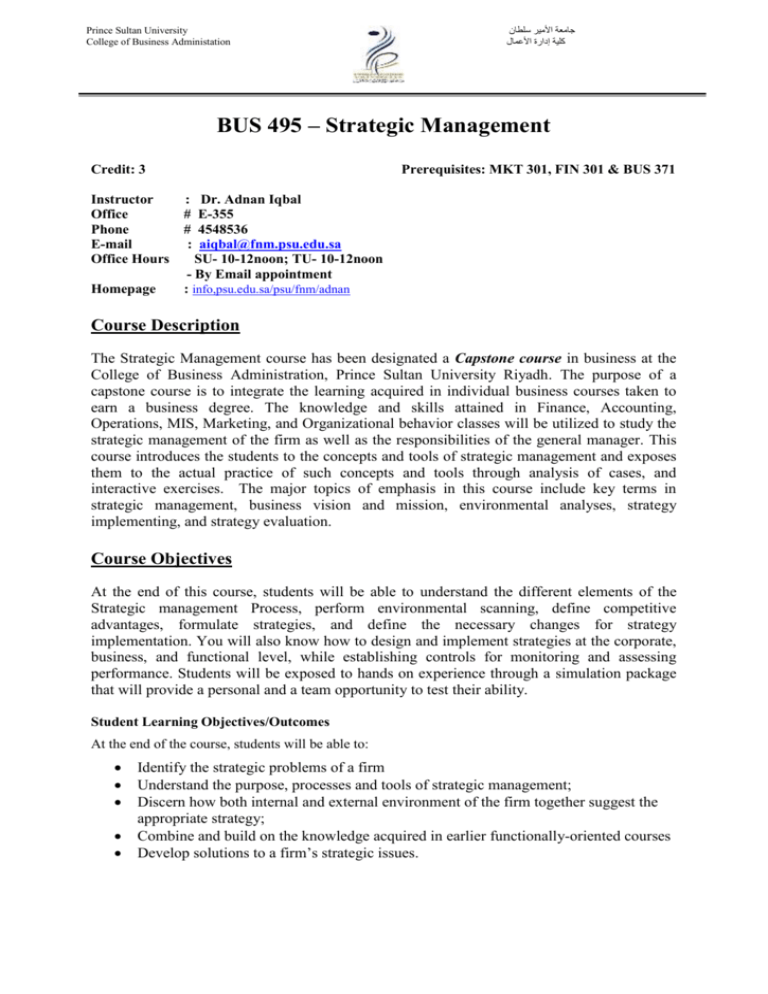
Prince Sultan University
College of Business Administation
جامعة األمير سلطان
كلية إدارة األعمال
BUS 495 – Strategic Management
Credit: 3
Instructor
Office
Phone
E-mail
Office Hours
Homepage
Prerequisites: MKT 301, FIN 301 & BUS 371
:
#
#
:
Dr. Adnan Iqbal
E-355
4548536
aiqbal@fnm.psu.edu.sa
SU- 10-12noon; TU- 10-12noon
- By Email appointment
: info,psu.edu.sa/psu/fnm/adnan
Course Description
The Strategic Management course has been designated a Capstone course in business at the
College of Business Administration, Prince Sultan University Riyadh. The purpose of a
capstone course is to integrate the learning acquired in individual business courses taken to
earn a business degree. The knowledge and skills attained in Finance, Accounting,
Operations, MIS, Marketing, and Organizational behavior classes will be utilized to study the
strategic management of the firm as well as the responsibilities of the general manager. This
course introduces the students to the concepts and tools of strategic management and exposes
them to the actual practice of such concepts and tools through analysis of cases, and
interactive exercises. The major topics of emphasis in this course include key terms in
strategic management, business vision and mission, environmental analyses, strategy
implementing, and strategy evaluation.
Course Objectives
At the end of this course, students will be able to understand the different elements of the
Strategic management Process, perform environmental scanning, define competitive
advantages, formulate strategies, and define the necessary changes for strategy
implementation. You will also know how to design and implement strategies at the corporate,
business, and functional level, while establishing controls for monitoring and assessing
performance. Students will be exposed to hands on experience through a simulation package
that will provide a personal and a team opportunity to test their ability.
Student Learning Objectives/Outcomes
At the end of the course, students will be able to:
Identify the strategic problems of a firm
Understand the purpose, processes and tools of strategic management;
Discern how both internal and external environment of the firm together suggest the
appropriate strategy;
Combine and build on the knowledge acquired in earlier functionally-oriented courses
Develop solutions to a firm’s strategic issues.
جامعة األمير سلطان
كلية إدارة األعمال
Prince Sultan University
College of Business Administation
Textbook Required
Strategic Management By Dess, Lumpkin, Eisner, McNamara & Kim, McGraw Hill 6th Edition
Suggested Supplimentary Books
1. Cunningham, J., and Harney, B. (2012) Strategy & Strategists, Oxford University Press.
2. Jay B. B, William S. H. (2011) Strategic Management and Competitive Advantage: Concepts and
Cases, Prentice Hall Inc.
3. Ireland, R. D., Hoskisson, R.E. and Hitt, M. A (2011) The management of Strategy Concepts,
4. Fred R. David; Strategic Management – Concepts and Cases, 13th Edition; Pearson, Prentice Hall;
2011.
5. Charles W. L. H and Gareth R. J (2011) Essential of Strategic Management, Cengage Learning
6. Hunger, J. D. and Wheelen, T (2010) Essentials of Strategic Management, Prentice Hall
Suggested Readings / Articles
7.
8.
9.
10.
11.
12.
13.
14.
15.
16.
17.
18.
19.
20.
The Contributions of Industrial Organization to Strategic Management (Porter, HBR 1981)
What is Strategy? (Porter, HBR, 1996)
What’s Wrong with Strategy? (Campbell & Alexander, HBR, 1997)
How Competitive Forces Shape Strategy (Porter, HBR, 1979)
Competing on Resources: Strategy in the 1990’s (Collis & Montgomery, HBR, 1995)
Crafting Strategy (Henry Mintzberg, 2001)
The Right Game: Use Game Theory to Shape Strategy (Brandenburger & Nalebuff, HBR, 1995)
Discovering New Points of Differentiation (MacMillan & McGrath, HBR, 1997)
From Competitive Advantage to Corporate Strategy (Porter, HBR, 1987)
Are You Paying Too Much for That Acquisition? (Eccles, Lanes, & Wilson, HBR, 1999)
Distance Still Matters: The Hard Reality of Global Expansion (Ghemawat, HBR, 2001)
Collaborative Advantage: The Art of Alliances (Kanter, HRB, 1994)
Why Incentive Plans Cannot Work (Kohn, HBR, 1993)
Rethinking Rewards (Perspectives in HBR, Nov-Dec, 1993)
Grading
Your grade will be based on the following:
Major Exams
Final Exam
Case Presentation
Business Simulation
Quizzes
Attendance
30%
40%
10 %
10%
05%
05%
You will be provided with handouts about the cases and simulation for this course. The deadline
given for assignment should be strictly adhered to.
Business Simulation. The STRATSIM® business simulation is incorporated into this course. The
simulation involves a competition involving hypothetical firms in the automobile industry. Based on
instructor guidance and team-based collaboration, teams prepare strategies for their assigned firms,
implement those strategies during ten competitive rounds that correspond to the years 2013-2023, and
evaluate the effectiveness of their strategies. Based on performance criteria and weights
communicated to all teams, the planning and results of this simulated competition generate points for
each team that comprise 10% of your grade.
جامعة األمير سلطان
كلية إدارة األعمال
Prince Sultan University
College of Business Administation
Course Contents (Subject to Change by Instructor If Necessary)
Week
1.
Chapter
1
Contents
Strategic Management: Creating Competitive Advantage
2.
1
What is Strategy? And What is Strategic Management?
The Four key attributes of StrategicManagement
Intended Vs Realized strategies
Handouts
Strategic Management: Creating Competitive Advantage
Strategic Management Stages: Analysis, Formulation and
Implementation
Alternative Perspective of Stakeholder
Organizational Visison, Mission and Objectives
Exercises
3.
Analyzing the Extenal Environment
2
The role of Scanning, Monitoring, CI and forecasting
SWOT analysis
The General Environment
Exercises
Analyzing the Extenal Environment of the firm
2
The general Environment
The competitive environment
Exercises
4.
5.
Assessing the Internal Environment of the firm
3
6.
Value chain Analysis
Application of VCA in Service Sector
Exercises
Assessing the Internal Environment of the firm
3
Resource based view
Evaluating Firm’s Performance
Exercises
MAJOR EXAM I
7.
Business Level Strategy: Creating and Sustaining CA
5
Porter Generic Strategies
Combination Strategies
جامعة األمير سلطان
كلية إدارة األعمال
Prince Sultan University
College of Business Administation
8.
5
9.
Business Level Strategy: Creating and Sustaining CA
Industry Life Cycle Stages and Strategies
Turnaround Strategies
Corporate Level Strategies
6
10.
Diversification modes
Related and Unrelated Diversification and Market powers
Corporate Level Strategies
6
11.
7
Means to achieve Diversification
Strategic Allainces, Mergers and Takeovers
Antitakeover Tactics
International Stratedy: Creating Value in Global Markets
International Expansions- Motivators and Risks
Entry Modes of International Expansion
MAJOR EXAM II
12.
Strategic Control and Corporate Governance
9
13.
Tradition Approach to Strategic Control
Contemporary Approach to Strategic Control
Attaining Behavioral Control
The Role of Corporate Governance
Creating Effective Organizational Designs
10
14.
Strategy and Organizational Structure
Boundaryless Organizations
Other Common type of Organizational Designs
Strategic Leadership: Creating a Learning organization
11
Element of effective Leadership
Emotional Intelligence
Learning Organization
15.
CASE Discussions and Analysis
16.
Revision and Discussions

